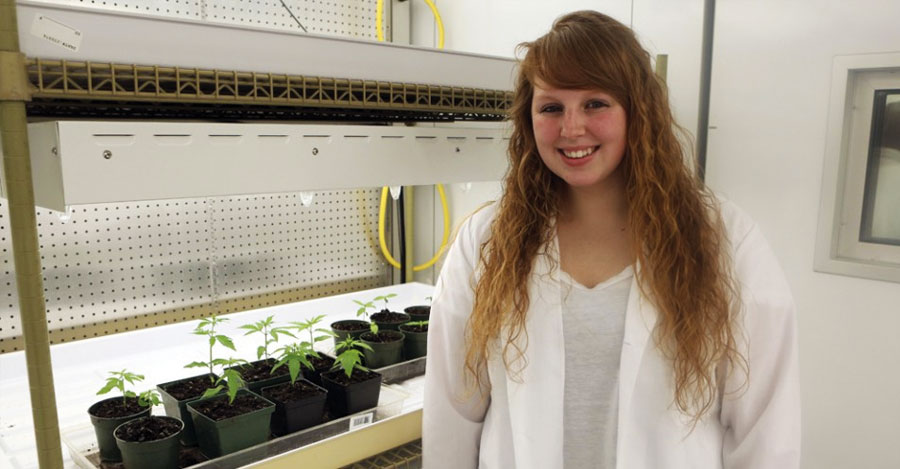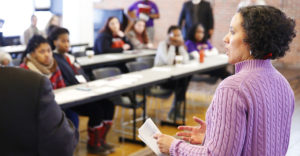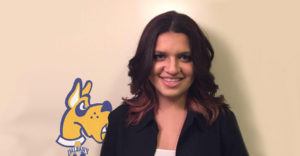
As an undergraduate at SUNY Cobleskill, Clara Richardson enjoyed the chance to do research in biotechnology. Her project focused on soybeans, and she valued the experience she gained. But she also wanted to widen her scope to encompass biomedicine.
So she was delighted to join the Summer Undergraduate Research Fellowship (SURF) program at SUNY Upstate Medical University in Syracuse.
SURF offers high-level research experience and more, Richardson says. “I’ve had an opportunity not only to use the latest instrumentation, but also the ability to network with professionals in the field.”
Richardson is one of eight SUNY undergraduates that was chosen for the ten-week SURF program this year from a field of 200 applicants. Each fellow works with a mentor to develop a project and carry it out. Fellows also attend seminars, give presentations on their work, learn about careers in research and get advice on applying to graduate school.
Dr. Mira Krendel, associate professor of cell and developmental biology at SUNY Upstate, is Richardson’s mentor. The summer project is part of the ongoing work in Krendel’s lab, which investigates how a particular group of proteins influences human health. Richardson is exploring how a protein called myosin 1e affects the progression of breast cancer.
The lab has already established a connection between myosin 1e and breast cancer development, Krendel says. “It looks like the amount of this protein in the tumor might help predict what kind of prognosis the patient will have.” Now, lab members are trying to determine the mechanisms involved. “We want to know how the protein contributes to cancer progression, and how we can use it to predict the outcome when we try to treat a tumor.”
In her project, Richardson examines breast cancer in mice, comparing the progression of “wild-type” tumors— those that contain naturally-occurring myosin 1e—and tumors with the myosin 1e removed. “Previous research has shown that the wild-type tumors are solid and full of cells, while tumors that have the myosin 1e knocked out are mostly filled with fluid instead of cells,” she says. Richardson seeks to discover what causes this difference. “We’re trying to determine if this knowledge could be used to treat breast cancer in humans.”
Richardson started the project by reading previous papers on her topic and getting familiar with procedures in Krendel’s lab. Since then, she’s been extracting RNA from mouse tumors and dissecting cancer tissue to determine the effects of myosin 1e.
Her project will culminate in a final paper. “Based on what we find, it could be published down the road,” says Richardson. Indeed, because her work contributes to the lab’s broader efforts, Richardson might be listed as one of the authors in a future publication from the lab, Krendel says.
Many of the fellows in the SURF program come to SUNY Upstate from other SUNY campuses that might provide an excellent background in laboratory research, but not the chance to try working in a medical school environment, Krendel says. “Students might not have had opportunities to be exposed to how a biomedical lab works, what the graduate students do.” SURF provides a taste of graduate-level research and insight into potential careers.
One particular strength of SURF is the way it requires each fellow to think a project through from beginning to end, formulating a hypothesis and developing a theme, Krendel says. “It’s not just telling them, ‘Go and do this.’ They have to figure out why they are doing it and what they think would be the best way to do it.” Fellows also attend presentations by the program’s mentors and read and discuss scientific papers. “They learn a lot about how science is done,” she says.
At the end of the SURF program, fellows usually present their work during a poster session at Syracuse University, which brings together summer undergraduate researchers from Syracuse University, SUNY Upstate Medical, SUNY College of Environmental Science and Forestry and other local institutions, Krendel says.
Unlike most fellows in the program, Richardson has already completed her bachelor’s degree; she graduated from Cobleskill in May, 2016—one year early. She plans to work in industry before deciding whether to enter graduate school.
The opportunities to conduct hands-on research at Cobleskill were excellent, but SURF has helped Richardson expand her horizons and gain new skills, she says. “I’m really happy with the experience I’ve gotten so far.”



